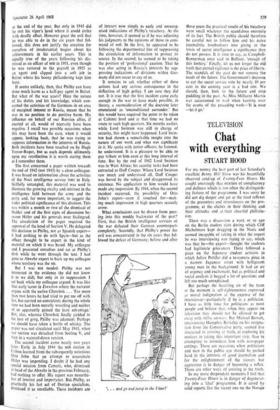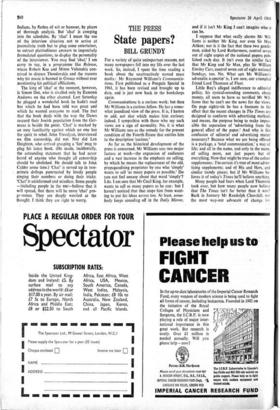Chat with everything
TELEVISION
STUART HOOD
For my money the best part of last Saturday's excellent Benny Hill Show was his beautifully observed send-up of Twenty-Four Hours. He caught unerringly that mixture of compladency and dullness which is too often the distinguish- ing feature of the programme. I was sorry he did not dig deeper and get at the tired reflexes of the presenters and interviewers on the pro- gramme, at the cliches in their thinking and. their attitudes and at their cheerful philistin- ism.
There was a discussion a week or so ago on the Berlin student riots during which Cliff Michelmore kept dragging in the Nazis and seemed incapable of taking in what the expert he was interviewing was trying to say, which was that he—the expert—thought the students had legitimate grievances. There followed a piece on the Japanese student activists in which Julian Pettifer did a to-camera piece in a narrow Japanese street with belligerent young men in the background. It had an air of urgency and excitement, but as political and social analysis it begged a lot of questions and left too much unexplained.
But perhaps the besetting sin of the team at the moment is self-righteousness expressed as moral indignation at the expense of the interviewee—particularly if he is a politician. I have as little time for politicians as most people and believe that, when they appear on television they should not be allowed to get away with shifty answers. But Michael Barratt, interviewing Humphry Berkeley on his resigna- tion from the Conservative party, seemed less interested in arriving at truth, at exploring his motives in taking this important step, than in attempting to intimidate him with newspaper cuttings. There are occasions when politicians and men in the public eye should be pushed hard in the interests of good journalism and for the enlightenment of the viewer; but aggression is in danger of becoming a reflex. There are other ways of arriving at the truth.
In my more despondent moments I feel that Twenty-Four Hours is in danger of degenerat- ing into a 'chat' programme. It is saved by solid reports like the recent one on the Navajo Indians, by flashes of wit or humour, by pieces of thorough analysis. But 'chat' is creeping into the schedules. By 'chat' I mean the use of the interview situation not to arrive at journalistic truth but to plug some entertainer, to extract platitudinous answers to imprecisely formulated questions, to display the personality of the interviewer. You may find 'chat,' I am sorry to say, in a programme like Release, where Robert Kee and Minos Volonakis con- trived to discuss Theodorakis and the reasons why his music is banned in Greece without ever mentioning his political affiliations.
The king of 'chat' at the moment, however, is Simon Dee, who is rivalled only by Eamonn Andrews on the other channel. Last Saturday he plugged a wonderful book he hadn't read but which he had been told was great and which he wanted everyone to read. The fact that the book deals with the way the Danes rescued their Jewish population from the Ger- mans is beside the point. 'Chat' is marked by an easy familiarity against which no one has the spirit to rebel. John Trevelyan, interviewed on film censorship, did not. Nor did Len Deighton, who arrived grasping a `fun' mug to plug his latest book. (He made, incidentally, the astounding statement that he had never heard of anyone who thought all censorship should be abolished. He should talk to John Calder some time.) 'Chat' is served up in two- minute dollops punctuated by lovely people singing their numbers or doing their tricks. 'Char is uninformed and mindless. Some people —including people in the BBC—believe that it will spread, that there will be more 'chat' pro- grimmes. They are deeply worried at the thought. I think they are right to worry.







































 Previous page
Previous page